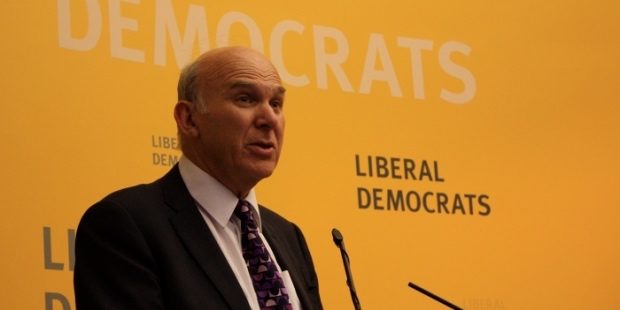
By Paula Keaveney, senior lecturer in PR and Politics
It is all change at the top of the Liberal Democrats, with Vince Cable replacing Tim Farron.
Cable’s position comes as a result of Farron standing down in the wake of the most recent General Election. The Lib Dems will forgo a leadership election though as Cable was the only nominated candidate after a series of likely contenders, including Scottish MP Jo Swinson and North Norfolk’s Norman Lamb, ruled themselves out.
Since the 2015 General Election, and 2016 Euro Referendum, the Lib Dems have seen membership soar. But the clear pro EU positioning in June failed to deliver much of an increase in seats. In fact, there were more lost deposits and a low vote share, leading to internal discussions about what happened and why.
So, what are the key challenges facing Cable?
Sir Vince does start with one advantage: He is known in a way that Farron was not when he took over. Cable became prominent for his prescient warnings over the economy in the run up to 2008. He has also had time standing in as Lib Dem leader – remember the soundbite about Gordon Brown going from Stalin to Mr Bean – and he was a Cabinet member during the Coalition.
So, the party has less to do in terms of making journalists and the wider public aware of who the new leader is. Being known will make it easier for him to gain broadcast time and print inches .
However, the profile of an individual leader does not necessarily mean the party’s image is right or the party well positioned.
The immediate challenge for Cable is party conference in September. It is one of the few guaranteed shop window events for a smaller party. Farron was known for his energetic , activist style. Cable will need to use the occasion to show that the party is very much back in business.
However, poll bumps as a result of a good conference rarely last and the first big challenges, barring any by elections, will be May 2018, when local elections include those in London (in which every seat is up for grabs) and in the Metropolitan Boroughs (in which some seats are contested in places like Liverpool and Manchester). In many cases the party will be attacking Labour which will be in the happy position of facing a Government party likely to be garnering poor reviews. This makes life very tricky for Lib Dems. A good showing is needed but this is not particularly fertile ground.
This means Cable will need to be very canny in terms of positioning. Some individual campaigns will go against the general run of play, but in many local elections people follow their general impressions of the parties on offer.
So which positions would work?
The clear ‘give people another say on the EU’ call did not work in the General Election. The ‘sage advice on the economy’ is useful but not unique. ‘More investment in schools, health and policing’ is usually a welcome message but is shared by just about every party.
There is no one position which is both stand-out and likely to work at the moment.
Of course, politics is not just the art of the possible. It is also the art of opportunity. In the past leaders such as Paddy Ashdown, Charles Kennedy and Tim Farron (on Hong Kong, Iraq and refugees respectively) have found and pursued issues which made clear calls about human rights and liberal values. Sir Vince will need to bide his time and be ready to recognise the issue which provides a liberal moment which resonates with the public.
He will also need to avoid overstatement early on. Reports in some media that he is likely to talk about making the Lib Dems the second largest party will worry long term activists. Many remember talk by former leaders of replacing Labour.
And meanwhile? Meanwhile the task is to reassure activists, many of whom did not see the poor result of 2017 coming, and take the fight to Theresa May in the Commons. The Mr Bean sound bite won’t work now, but I feel sure the Lib Dem team will be looking for something equally cutting and memorable.
